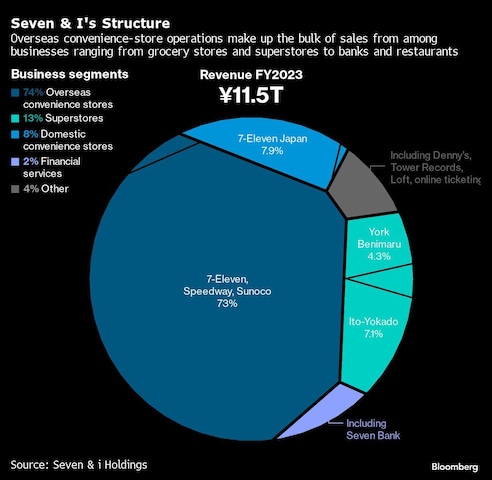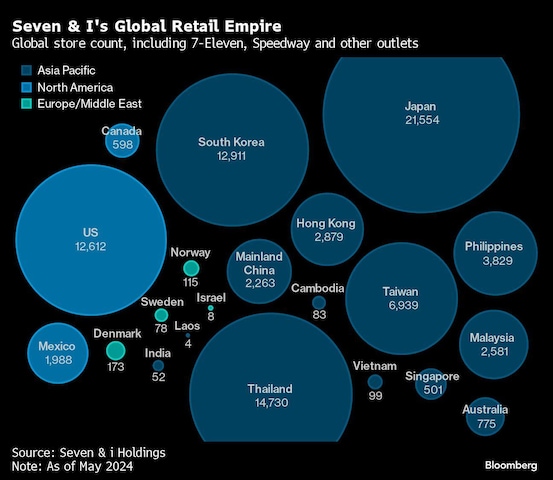By Eru Ishikawa
Seven & i Holdings Co., the target of a takeover proposal by Canada’s Alimentation Couche-Tard Inc., is a sprawling global retailer whose businesses include banking, online ticketing, grocery stores and even Tower Records, a once-popular U.S. record store that went bankrupt.
The Japanese retailer began as a clothing store a century ago and evolved into a general merchandiser, selling everything from groceries and sundries to clothing and household items as Ito-Yokado. After bringing 7-Eleven stores and Denny’s restaurants to the country in 1974, the convenience store concept proved to be transformative for the company, which later acquired the entire chain and embraced it as part of its name.
In recent years, Seven & i’s expansion has attracted the attention of activist investors, who have urged the retailer to focus on turning the 7-Eleven network into a global powerhouse, given the strength of its brand and operational prowess. The Japanese retailer should be worth more than it is now — ¥5.62 trillion ($38.4 billion) — without a conglomerate discount, they have argued.
Seven & i has responded by streamlining its business; last year the retailer sold the Sogo & Seibu Co. department store chain and is considering a public listing of its Ito-Yokado stores. But with Couche-Tard’s approach and continued scrutiny from investors, the pressure on the Japanese company to increase its value will remain.
Any potential deal to buy Seven & i in its entirety would be the largest inbound acquisition ever in Japan. Here’s a look at what the company entails:
7-Eleven Japan
With 21,618 stores across the archipelago, 7-Eleven is Japan’s largest retailer, offering a range of food, beverages and goods, as well as its own ATM network and other services. Along with competitors FamilyMart and Lawson, convenience stores can be found in almost every part of the island.
The franchise is known for its grab-and-go meals, ranging from egg salad sandwiches and fried chicken to bento boxes and noodles. Seven & i sells more than 2 billion onigiri rice balls each year. Sales totaled ¥5.3 trillion in the latest fiscal year through February.
The franchise’s private-label goods, 7-Premium, can be found in other stores within the Seven & i empire. The retailer has also partnered with cities and towns so residents can access and print official documents at any 7-Eleven without having to visit government offices.
American and Asian convenience stores
The world’s first convenience store, the forerunner of 7-Eleven, opened in 1927 on the docks of an ice cream parlor in Dallas, Texas. The company grew into an iconic American brand with memorable names for beverage products like the Big Gulp and Slurpee. It became a destination for people on the go, especially at gas stations.
7-Eleven also pioneered the use of to-go coffee cups, self-service soda fountains and hot food. It has become a popular convenience store in other Asian countries, including Singapore, Taiwan and China. Seven & I now includes Speedway and Sunoco stations in North America.
7-Elevens operates in 19 countries, with franchises owned by individual store owners and company-owned outlets, totaling over 84,000 stores.
Ito-Yokado, supermarkets
Seven & i’s original retail operation, which preceded the 7-Eleven meeting, had its roots in a small store in Tokyo’s Asakusa district. Ito-Yokado has more than 28,000 employees and sells household products, food and clothing, often in prime locations. With 21 stores in 18 prefectures, the group earned ¥1.2 trillion in its last fiscal year.
Over the years, Ito-Yokado expanded internationally, opening stores in Chengdu and Beijing. In 2023, Ito-Yokado merged with York Corporation, a supermarket chain. Ito-Yokado’s logo, a white dove flying behind a blue and red background, is widely recognized in Japan.
Shell Garden is a high-end supermarket by Seven & i, located mainly in the Tokyo area, with a selection of health-oriented and imported foods. York-Benimaru has 247 stores in Northern Japan, while Tenmaya stores can be found in Okayama Prefecture on the main island of Honshu.
There is also Seven Farm, which collects food waste and turns it into compost, which is used to grow vegetables that are sold in the shops.
Financial services
Many people can do their banking at ATMs in 7-Eleven branches. ATMs have also become an indispensable tool for foreign tourists to withdraw money while visiting Japan.
With over 27,000 terminals, the ATMs are not only found in shops, but also at airports and train stations. The banking service is also active abroad, with around 3,800 ATMs in Indonesia and the Philippines, and 15,400 in North America.
Other banking services covered by the franchise include FCTI, a U.S. provider of ATMs and financial technology solutions, as well as Japanese credit card companies, financial services providers and payment systems that use the holding company’s logo.

Tower Records, Akachan Honpo
The iconic record store, which went bankrupt in the US and was revived as an online music store, still exists in Japan as a Seven & i company. An eight-story building stands in Tokyo’s Shibuya district, adorned with the striking red letters Tower Records against a yellow background.
Tower Records debuted in Japan in 1979 as an importer of vinyl records. The store and brand proved to be an enduring hit, with cafes, live spaces to host concerts, and collaborations with artists and personalities to sell clothing and merchandise.
Like Babys R Us, Akachan Honpo has been operating in Japan for decades, selling children’s clothing, diapers, toys and strollers in 126 physical stores and through its app, which has more than 2 million users. Net sales were ¥83 billion in the year ended February.
Security services
York-Keibi, a subsidiary, manages a variety of security personnel for transportation, facilities and events.
The company even uses security guards who pose as regular customers to patrol against shoplifters, providing professional services to various customers.
E-commerce and online ticketing
Seven Net Shopping is the franchise’s most prominent e-commerce platform, offering merchandise, e-books, CDs and games, with an annual turnover of ¥19.2 billion. Other online sites include Seven Dream Dot Com, one of the first companies to enter the market with 7-Eleven stores as a platform. The company also operates ticketing services and operates call centers.
Pia Corporation is one of Japan’s leading ticketing and entertainment companies, organizing music events and providing media content focused on leisure activities. The company also handles ticketing for international events, including the Tokyo 2020 Olympic Games.
Attic
Loft stores are often compared to Muji and attract buyers looking for stylish home furnishings.
Loft has 138 stores and a recognizable mustard yellow logo. It sells lifestyle products ranging from office supplies to interior decoration.



